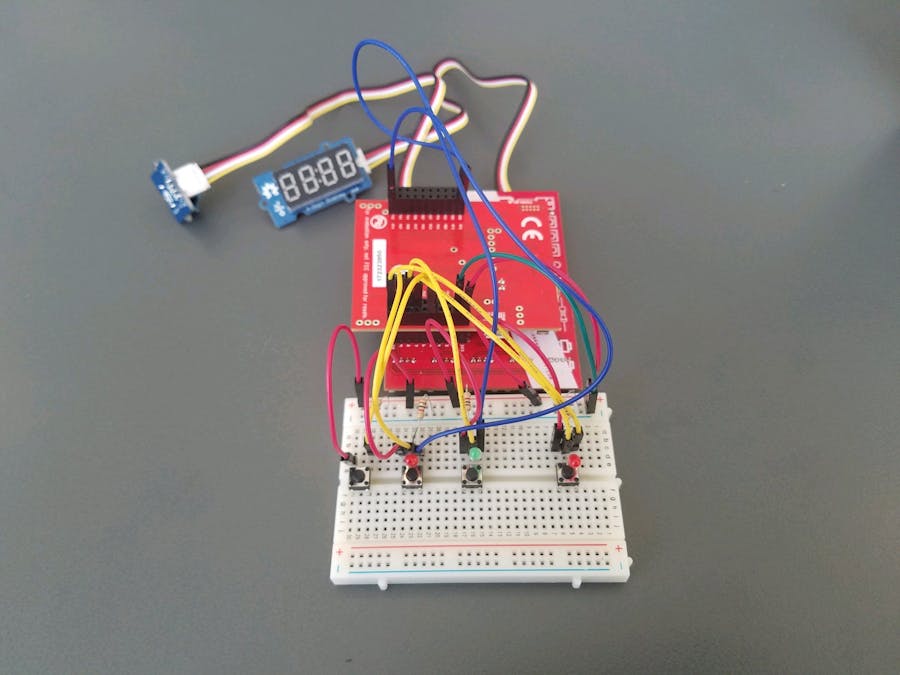#include "TM1637.h"
#include "helpers.h"
#include "time.h"
#include <stdlib.h>
#include <stdio.h>
#include <math.h>
#include <stdarg.h>
#define CLK 39//pins definitions for TM1637 and can be changed to other ports
#define DIO 38
#define BUZZER_PIN 36 // pin of grove buzzer
TM1637 tm1637(CLK, DIO);
// Preallocations:
unsigned int volatile *pGPIODATA = (unsigned int *) (PortF + GPIODATA);
unsigned int volatile *pGPIODATAE = (unsigned int *) (PortE + GPIODATA);
unsigned int volatile *pGPIODATAA = (unsigned int *) (PortA + GPIODATA);
char names[] = { 'c', 'd', 'e', 'f', 'g', 'a', 'b', 'C' };
int tones[] = { 1915, 1700, 1519, 1432, 1275, 1136, 1014, 956 };
int pattern[100];
int pinList[] = {pin1, pin2, pin4};
int count = 3;
volatile int start = 0;
int volatile correct_pattern = 1;
const int PE1 = 27;
const int PE2 = 28;
const int PE3 = 29;
const int PE4 = 5;
volatile int button_pressed = 3;
int randomizePattern = 1;
/* Setup */
void setup() {
// Pins for reading buttons
SetupDigitalGPIO(PortE, pin1, INPUT, INTERRUPT);
SetupDigitalGPIO(PortE, pin2, INPUT, INTERRUPT);
SetupDigitalGPIO(PortE, pin3, INPUT, INTERRUPT);
// Setup start button
SetupDigitalGPIO(PortE, pin4, INPUT, INTERRUPT);
// Setting up interrupts for buttons
attachInterrupt(digitalPinToInterrupt(PE1), is_pressed0, CHANGE);
attachInterrupt(digitalPinToInterrupt(PE2), is_pressed1, CHANGE);
attachInterrupt(digitalPinToInterrupt(PE3), is_pressed2, CHANGE);
attachInterrupt(digitalPinToInterrupt(PE4), startGame, FALLING);
// Pins for sending signals to lights
SetupDigitalGPIO(PortF, pin1, OUTPUT, NoINTERRUPT);
SetupDigitalGPIO(PortF, pin2, OUTPUT, NoINTERRUPT);
SetupDigitalGPIO(PortF, pin4, OUTPUT, NoINTERRUPT);
// Testing port
SetupDigitalGPIO(PortA, pin2, OUTPUT, NoINTERRUPT);
// Initializes the 4-digit display
tm1637.init();
tm1637.set(7);//BRIGHT_TYPICAL = 2,BRIGHT_DARKEST = 0,BRIGHTEST = 7;
// Initializes the pizo buzzer
pinMode(BUZZER_PIN, OUTPUT);
}
void random_pattern(int randomizePattern) {
// Creates a random password based on a 'random' number, to further
// randomize the pattern
randomSeed(randomizePattern);
for (int i = 0; i < 100; i++) {
int randomNumber = random() % 3;
pattern[i] = randomNumber;
}
}
void startGame() {
// This activates when the start button is pressed.
// Starts a light pattern that signals the start
// of the game.
// Creates the random pattern to be used for the game.
random_pattern(randomizePattern);
// Creates a light sequence to indicate the start of the game.
*pGPIODATA |= pin4;
delay(100);
*pGPIODATA |= pin2;
delay(100);
*pGPIODATA |= pin1;
// buzzer
delay(400);
*pGPIODATA &= ~pin1;
delay(100);
*pGPIODATA &= ~pin2;
delay(100);
*pGPIODATA &= ~pin4;
delay(375);
// Resets the 4 digit display
tm1637.display(3, ' ');
tm1637.display(2, ' ');
tm1637.display(1, ' ');
tm1637.display(0, ' ');
// Begins the game
correct_pattern = 1;
start = 1;
randomizePattern++;
noInterrupts();
}
/* Code for buzzer */
void playNote(char note, int duration) {
// play the tone corresponding to the note name
for (int i = 0; i < 8; i++) {
if (names[i] == note) {
int tone = tones[i];
for (long i = 0; i < duration * 1000L; i += tone * 2) {
digitalWrite(BUZZER_PIN, HIGH);
delayMicroseconds(tone);
digitalWrite(BUZZER_PIN, LOW);
delayMicroseconds(tone);
}
}
}
}
/* Code for the counter */
void update_counter(int count) {
// This function updates the 4 digit display to show the current score
// of the player.
interrupts();
if (count > 9999) {
}
else if (count > 999) {
tm1637.display(0, (count / 1000));
tm1637.display(1, ((count / 100) % 10));
tm1637.display(2, ((count / 10) % 10));
tm1637.display(3, (count % 10));
}
else if (count > 99) {
tm1637.display(1, (count / 100));
tm1637.display(2, ((count / 10) % 10));
tm1637.display(3, (count % 10));
}
else if (count > 9) {
tm1637.display(2, (count / 10));
tm1637.display(3, (count % 10));
}
else {
tm1637.display(3, count);
}
noInterrupts();
}
/* Start of code that displays the pattern */
void blink (int light_color) {
// This function turns the light corresponding to light_color on and then off.
noInterrupts();
if (light_color < 3) {
int pinSwitched = pinList[light_color];
*pGPIODATA |= pinSwitched;
playNote(names[light_color], 200);
delay(1000);
*pGPIODATA &= ~pinSwitched;
}
delay(250);
}
void display_pattern(int count) {
// This function turns lights on in an order
// corresponding to the pattern.
int i = 0;
button_pressed = 3;
while (i < count) {
blink(pattern[i]);
i++;
}
}
/* Start of check button code */
// Interrupts for each of the three game buttons
void is_pressed0() {
button_pressed = 0;
playNote('c', 200);
}
void is_pressed1() {
button_pressed = 1;
playNote('d', 200);
}
void is_pressed2() {
button_pressed = 2;
playNote('e', 200);
}
int check_pattern(int count) {
// For each item in the pattern...
int i = 0;
delay(375);
for (i; i < count; i++) {
button_pressed = 3;
// Wait for 3 seconds or until a button is pressed
int is_right = check_each(pattern[i]);
if (is_right == 0) {
return 0;
break;
}
}
return 1;
}
int check_each(int color) {
// Checks what button is pressed in a certain interval of time
// If no button or the wrong button is pressed, returns 0, if
// the button pressed is correct, return 1.
interrupts();
*pGPIODATAA |= pin2;
int j = 0;
button_pressed = 3;
while (button_pressed == 3) {
j++;
delay(1.5);
if (j > 2000) {
break;
}
}
*pGPIODATAA &= ~pin2;
noInterrupts();
if (button_pressed == color) {
delay(250);
return 1;
}
else {
return 0;
}
}
void loop() {
// Loop to ensure that the game does not start before the
// start button is pressed.
while (start == 0) {}
count = 3;
delay(1000);
// Once the start button is pressed,
while (correct_pattern == 1) {
// Set the button pressed to none
button_pressed = 3;
// Update counter with the correct score
update_counter(count);
// Display pattern the length of the correct score
display_pattern(count);
// Check for the correct pattern to be entered
correct_pattern = check_pattern(count);
delay(250);
count++;
}
// Game over lights and sounds
if (correct_pattern == 0) {
*pGPIODATA |= pin1;
*pGPIODATA |= pin2;
*pGPIODATA |= pin4;
playNote('e', 200);
playNote('d', 200);
playNote('c', 200);
delay(3000);
*pGPIODATA &= ~pin1;
*pGPIODATA &= ~pin2;
*pGPIODATA &= ~pin4;
}
// set start to 0, so game can be reset
interrupts();
start = 0;
}

















Comments